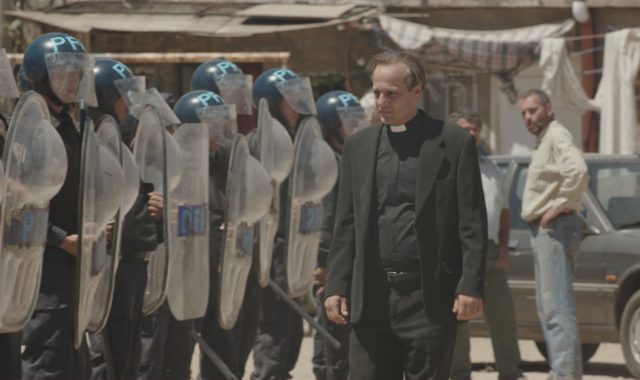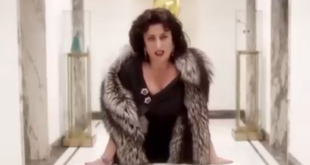
The 16th edition of Open Roads: New Italian Cinema kicks off today, showcasing Italy’s contemporary filmmakers and their unique perspectives of the social issues facing their country.
Co-organized with Istituto Luce Cinecittà in collaboration with the Italian Cultural Institute of New York, this year’s lineup is diverse. Maria Sole Tognazzi’s “Io e lei” (Me and Her) opens the series on Thursday. The Tognazzi cinema dynasty is thriving right now with four prolific offspring of the great Ugo Tognazzi: actor/director Ricky; actor Gian Marco; Norwegian producer/director Thomas Robsahm; and the youngest, director Maria Sole. I happened to be in Italy when “Io e lei” was released. The film took the number one spot, grossing €700,000 opening weekend while dominating the Italian talk show circuit.
“Io e lei” is the story of two women in a relationship like any other, with tumultuous and loving moments. Margherita Buy and Sabrina Ferilli portray lovers Federica and Marina in a way that puts love first and the fact that it’s a same-sex relationship second. The two actresses made the rounds all over Italian television answering questions relating to gay and lesbian relationships. But when I saw the film, that element was clearly secondary to the affection the two feel for each other. Perhaps Ferilli’s description in an interview with Italian media best explains it: a story about sentimentality rather than homosexuality. While watching the story play out, I felt sadness for Buy’s character as she tried to overcome her shame at being in a first-time relationship with a woman, and sadness for Ferilli’s character in dealing with the consequences of that shame. While the characters ride a roller coaster of emotions, the writers manage to slip in some hilarious scenes, taking full advantage of actor Ennio Fantastichini’s limitless talent for comedy.
The blockbuster hit “Lo chiamavano Jeeg Robot” (They Call Me Jeeg) was recently awarded Italian Oscars for Best Director, Actor, Actress and Supporting Actor. These are well-deserved honors for a film that is absolutely spectacular in every sense. A classic tale of good guys vs. bad guys, the film starts with a chase through the streets of Rome that leads to the banks of the Tiber River, where the bad guy who eventually morphs into the good guy jumps into the river to hide from the police. While submerged, he is exposed to radioactive materials that give him superhuman strength. Upon this self-discovery, he runs to the nearest ATM machine and literally pulls it out of the wall and carries it home. The whole thing was caught on tape by the surveillance camera and he instantly becomes a YouTube star. He ends up falling for the mentally challenged but gorgeous daughter (Ilenia Pastorelli) of a fellow criminal, all the while a competing thug is becoming insanely jealous of his sudden fame. This sets the stage for one amazing brawl and chill-inducing final scene that embraces the inherent magic of cinema. From the performances to the effects to the dialogue, I thoroughly enjoyed every moment of this film. “Lo Chiamavano Jeeg Robot” is the Italian version of a Hollywood action film. The difference is in the development of the characters rather than the plot. Although the plot and effects are dramatic, the audience falls in love with or grows to hate the characters. The good guy (Claudio Santamaria) tugs at your heartstrings while the bad guy (Luca Marinelli) is the epitome of detestable. The performances by these two actors are nothing short of stellar.
Perhaps due to the popularity of Pope Francis, there are two fascinating films in the lineup that offer insight into the Vatican and a behind-the-scenes look at the life of the adored pontiff. Gianfranco Pannone’s documentary “L’esercito più piccolo del mondo” (The Smallest Army in the World) explores the fascinating world of the Vatican’s Swiss Guard.
Pannone takes his camera to Switzerland, where the journey begins for the young recruits, and then inside Vatican City as they are trained and fitted for their famously colorful uniforms. The young men, who come from all walks of life, offer their thoughts on how the Catholic Church should change with the times in order to stay relevant and modern. There are tender moments in which we see Pope Francis greeting people and one scene in which he is just calmly walking by himself.
You will never look at Pope Francis the same way again after seeing Daniele Luchetti’s docu-drama “Mi chiamatemi Francesco” (Call Me Francesco — The Pope). The film traces his life from Argentina, where a young Jorge Mario Bergoglio decides to join the monastery, to the Vatican, where he is presented at St. Peter’s Basilica as Pope Francis. The film gives an interesting look into Argentina’s “Dirty War,” also known as the Process of National Reorganization, which took place from 1974 to 1983. It was a dark time in modern history when the country was living under a dictatorship. Human rights activists, clergy included, were tortured and killed during those years. One horrific incident was the disappearance of Pope Francis’ dear friend and mentor, Esther Ballestrino. Known today as a martyr, she was kidnapped by police, taken to a detention center where she was tortured for 10 days, allegedly drugged and then literally thrown out of a military aircraft into the Argentine Sea. To this day, Pope Francis is in touch with Ballestrino’s family and met with her daughters last year while he was in Paraguay. Argentine actor Rodrigo De la Serna gives a powerful performance as the young pontiff. This is a captivating film that beautifully interprets Pope Francis’ life.
Laura Morante will make a rare New York appearance to present her latest directorial effort, “Assolo” (Solo), in which she plays a lead role. With echoes of a Woody Allen film, the jazzy soundtrack and tormented characters take us through the life of Flavia, a middle-aged divorcee struggling to come to terms with the revolving door of men in her life and the dysfunctional women she attracts as friends. Morante’s character, although troubled, is whimsical and charming. Having followed her work since the mid-’90s, I recognized many qualities of her former characters in this role. A hidden gem in this film is the young actor Giovanni Anzaldo, who plays the son of Morante’s character. I contacted Anzaldo last year after seeing his magnificent performance in Paolo Virzì’s “Human Capital” and learned the layered characters he creates onscreen are not much different from the layered character he is in life, one that speaks in metaphors about his art, struggles and dreams for the future. It’s no wonder he takes over every scene he’s in. Anzaldo’s part may be small in “Assolo,” but don’t miss this up-and-coming star. We’ll be seeing a lot more of him in years to come.
I have been attending Open Roads since the very first edition in 2001 and it has been a joy to see how the festival has grown and evolved to what it is today. When I began interviewing the filmmakers in 2004, I was the only English-speaking journalist. Now, I am seeing new articles everyday written by American journalists discovering the treasure trove of modern Italian cinema. We have not yet seen stars or directors emerge as they did in the Golden Age with Vittorio De Sica, Federico Fellini, Sophia Loren and Marcello Mastroianni. Perhaps it is because there are so many young and talented filmmakers writing and making movies about a wide variety of topics. When searching the modern cinematic landscape for parallels to the dynamic among those legends, a few names come to mind in addition to Anzaldo. They are Edoardo Leo, Anna Foglietta, Paolo Genovese, Sergio Castellitto and Margaret Mazzantini. The writing/directing collaboration of husband-wife team Castellitto and Mazzantini coupled with the strong chemistry between Leo and Foglietta, may foretell the reemergence of that Golden Age star power. However, I am not convinced the new generation is interested in repeating history. For as much as they respect and draw from their iconic predecessors, they are creating their own cinema and telling the stories of their generation, And even though they post their international accolades on social media, their interest seems to lie in pleasing and being understood by the audiences of Italy.
Open Roads: New Italian Cinema runs June 2 to 8 at Lincoln Center in New York. For the complete lineup of films, visit the Film Society of Lincoln Center online at www.filmlinc.org.
 Fra Noi Embrace Your Inner Italian
Fra Noi Embrace Your Inner Italian






